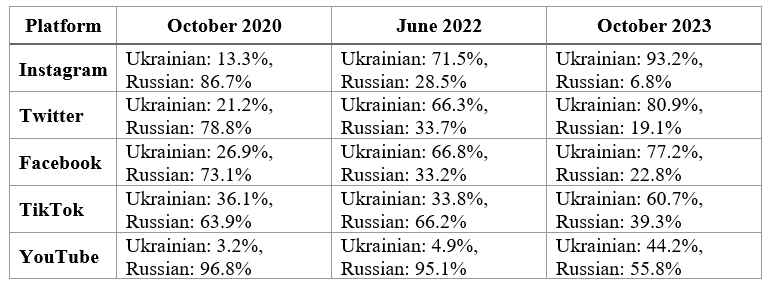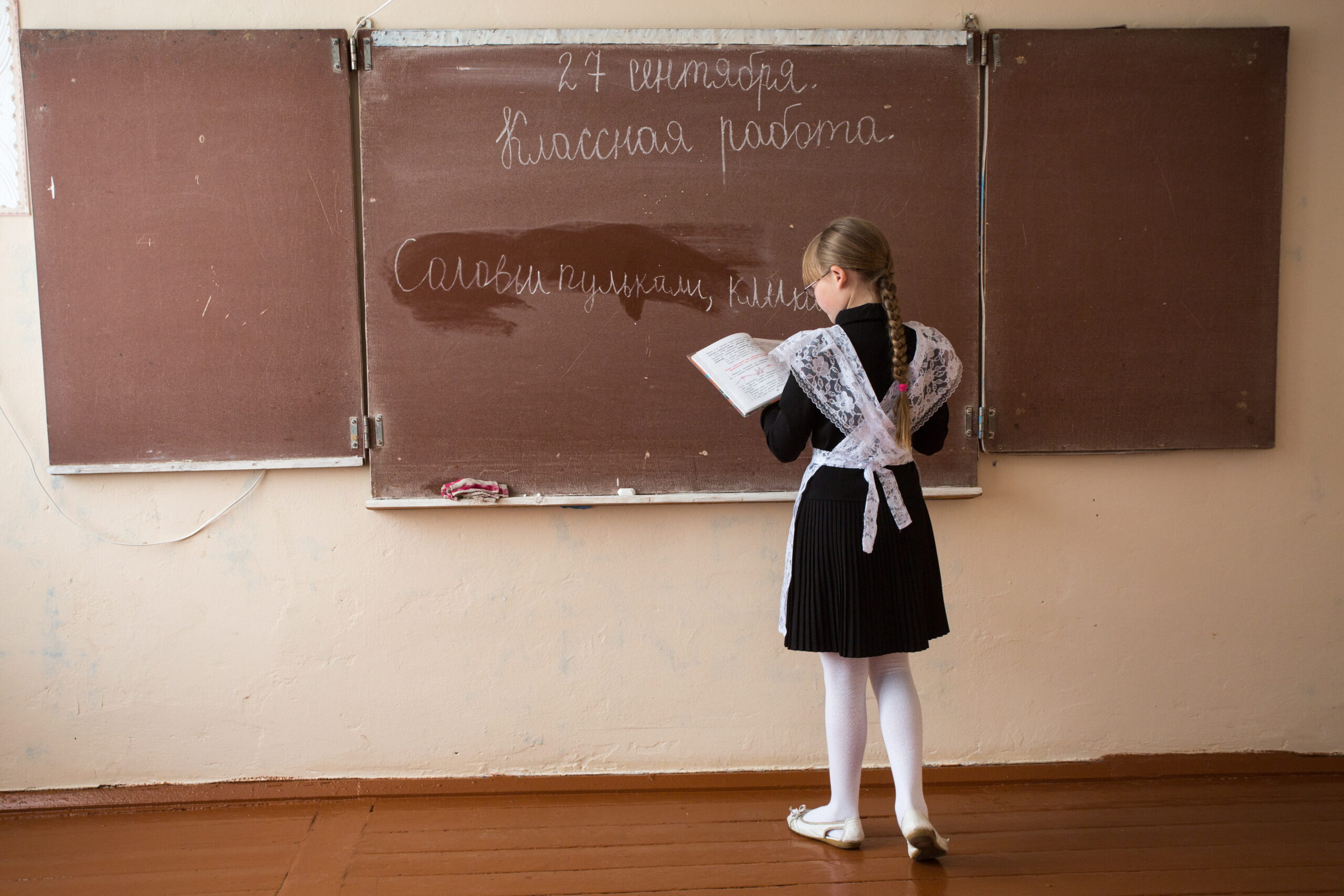On December 31st last year Vladimir Putin marked a quarter of a century in the Kremlin, a period which has seen him increasingly in thrall to an ideology known as the Russkiy Mir, or Russian World. It is a worldview that sees Moscow as responsible not only for the 143 million citizens of the Russian Federation, but also for protecting the Russian language and culture around the world.
Cynics will argue that the idea of a Russian World is a mere fig leaf for the Kremlin’s revanchist territorial ambitions. But let’s assume Putin is serious about protecting linguistic heritage. As we approach the 25th anniversary of his ascent to power, perhaps now is a good time to examine the state of «the great and mighty Russian language» outside of Russia.
Ukraine
Historically, language data for Ukraine has been notoriously hard to come by and is politically charged. There hasn’t been a census since 2001. That census had 67% of the population citing Ukrainian as their mother tongue, with 30% speaking Russian. However, this masked the fact that many people were bilingual, as well as the de facto use of Russian in many larger cities in the east and south.
Russian also dominated the cultural industries — in 2014, as many as 80−85% of books were printed in Russian. Even as recently as 2021, two-thirds of all TV series on the five most-watched channels in Ukraine were in Russian. In Servant of the People, the show in which Volodymyr Zelensky laid the groundwork for his presidential run, such is the dominance of Russian language that it seems almost anachronistic.
Despite a number of laws seeking to entrench the role of Ukrainian from Euromaidan onwards, including limiting the import of Russian books and mandating that Ukrainian must be used in all customer service interactions, it has taken the full-scale invasion to supercharge Ukrainian linguistic identity. Many internally displaced persons from Ukraine’s East, who grew up speaking Russian, have made the conscious decision to switch languages since the onset of war.
The linguistic reversal can be seen most profoundly on social media. The Center for Content Analysis has been studying the ratio of posts from Ukrainian accounts in Ukrainian and Russian languages since 2020. Their data show a remarkable shift, particularly on Instagram, with a ratio of 87:13 in favour of Russian in October 2020, to a ratio of 93:7 in Ukrainian’s favour by October 2023. Other social media display similar trends:

Eastern Europe and the Baltics
Further north, Russian’s linguistic grip is stronger. Belarusians have a habit of telling you that they consider Belarusian to be their native language, although for almost all practical purposes they speak Russian. The country’s leader, Alexandr Lukashenko, came to power in 1994 and made official language status for Russian a priority, ending a brief Belarusian renaissance. Technically Russian is the «joint» official language, but in major cities such as Brest and Minsk, the only nod to the existence of Belarusian tends to be in the street signs. Although taught in schools and despite attempts by the exiled opposition to promote it, Belarusian remains little used outside the west of the country.
Russian has been more effectively confronted in the public sphere in the Baltic States. This is understandable in Lithuania, the most ethnically homogenous of the three, however, 25−30% of Latvia and Estonia’s populations are native Russian-speakers, with cities like Daugavpils in Latvia and Narva in Estonia almost entirely Russophone. Both Riga and Tallinn are also around 50% Russian speaking.
Russian speakers are often demonised, especially in Latvia, and are seen as a potential fifth column — ready to rise up and create a «new Donbas». The Latvian government has recently proposed removing Russian from the classroom in these regions, drawing criticism from the UN. Meanwhile, Estonia has begun offering Estonian language training for Russian-speaking school teachers in Narva, while firing those who have not achieved a B2 level of competence.
This ignores the fact that many Russian speakers oppose Putin’s war and rather like the freedoms offered to them inside the European Union. Indeed, many of these Russian speakers are Ukrainian refugees, 50,000 Ukrainians are currently in Estonia, with a similar number in Latvia and 68,000 in Lithuania.
The Caucasus
Georgia and Armenia, while being of geo-strategic interest to the Kremlin, are not home to large numbers of native Russian speakers. Both are fiercely proud of their language, and especially their unique, millennia-old scripts.
However, the Azerbaijani capital Baku was historically a cosmopolitan city, with large Slavic, Armenian and Jewish communities that gave Russian the status of lingua franca. Around 10% of state schools in Azerbaijan teach in Russian, totalling around 160,000 students, in addition to another 16,000 in the country’s universities. These schools — known locally as the «Russkiy Sector» — are often over-subscribed and viewed as higher quality than an Azeri language education.
Outside the centre of Baku, however, the influence of Russian has waned dramatically, and the larger competitor to Azeri comes in the form of its close cousin, Turkish. When a new Hollywood film is released, it is usually dubbed in Turkish or Russian; the same holds true for translations of world literature or children’s cartoons. Meanwhile, the worldwide popularity of Turkish sit-coms, known as dizis, has helped Turkish encroach ever deeper on the consciousness of young and old alike.
Central Asia
The countries of Central Asia have for many years had an inferiority complex when it comes to their own tongues, which were deemed rural and backward. In the Soviet period, some major cities were so Russified that it would have been rare to hear the titular language at all. Almaty, Kazakhstan’s former capital, was only about 20% ethnically Kazakh in the 1980s, and had only two Kazakh language schools.
Since independence, Kazakh has made strides in the public sphere. The first President, Nursultan Nazarbayev, encouraged Kazakhs in other former Soviet republics to move to their ancestral homeland. Meanwhile waves of migration from the countryside to the cities have contributed to a revival of Kazakh in the large urban centres, a trend that can be observed with indigenous languages across Central Asia.
Politics, so long conducted in Russian, has also begun to switch. Last year, Kazakh President Kassym-Jomart Tokayev made waves when he spoke in Kazakh at a joint-press conference with Vladimir Putin, leaving an unprepared Russian delegation scrambling for their audio-translations.
Another derussification tactic has been to break the orthographical links between Central Asian languages and Russian, by switching from the Cyrillic to Latin script. In Azerbaijan and Turkmenistan, this has been done decisively, whereas in Uzbekistan and Kazakhstan it remains an ongoing process, encountering particular resistance from elder generations.
Russia’s traditionally strong influence in media has also begun to be challenged. While many artists continue to perform in Russian to reach a wider international audience, as shown by the success of the Russian-language TV show Central Asia’s Got Talent, others increasingly opt for their native tongue.
The fact that, aside from Tajik, most Central Asian languages have Turkic roots and shared vocabulary means that many artists are popular across borders: Uzbekistan’s Osman Navruzov and Azerbaijani artist Nefes recently collaborated on Osiyoda Evropada, sung in both languages and racking up 11 million views on YouTube. Meanwhile the Q-Pop phenomenon has shown a new generation of bands preferring to sing in Kazakh only.
Digging in its heels
Against these patriotic trends, Russian is nevertheless holding up surprisingly well. It remains the language of inter-ethnic communication in many countries. Minority peoples ranging from the Gagauz in Moldova, Karakalpaks in Uzbekistan, or Koreans in Kazakhstan tend to use Russian to voice themselves politically. Millions of workers from the Caucasus and Central Asia also move to the Russian Federation for job opportunities. According to the World Bank, remittances from migrant labourers accounted for 17% of GDP in Uzbekistan, 20.5% in Kyrgyzstan and an enormous 48.2% in Tajikistan in 2023.
Rival tongues
Another problem is Russian’s vulnerability to English as the predominant second language. It’s already a fait accompli in the Baltics, where a high level of English among young generations is almost a given. Young Georgians are increasingly likely to speak English over Russian. That said, Russian has an entrenched presence of trained teachers across the former Soviet space, and its status as the language of the elite in Central Asia and the Caucasus will see it hard to dislodge in the short term.
There is less concern about Chinese. Even in Central Asia, where Beijing’s influence is strongest, only 20,000 students were enrolled across its sixteen Confucius Centres in 2023. The rigour required to learn Chinese characters, as well as the limited cultural connection — and in many cases outright Sinophobia — suggests that Mandarin has a long way to go. That said, China’s economic pull and the march of its higher educational institutions up the world rankings has seen many Central Asians choose to study there, which included 15,000 Kazakhs, 8,000 Uzbeks and over 4,000 Tajiks in 2023.
Lingua franca Aeterna?
You’d have to say it’s a mixed picture. Barring a dramatic upturn in the Russian army’s fortunes, it’s hard to see a scenario where Russian will return to its former pre-eminence in Europe. In Central Asia and the Caucasus, given the disparity in wealth between Russia and these states, as well as the limited opportunities elsewhere, business sense will dictate that Russian will be taught to the next generation. Should Russia’s economy strengthen, these trends will be compounded.
But the Russian economy is currently in dire straits, and this is what makes Putin’s claim to be a defender of the Russian language abroad all the more perverse. When he came to power, Russian language and culture could boast some inherent strengths: high quality education; influential music and cinema; world class literature; legions of well-trained Russian language teachers; and a visa regime that is comparatively welcoming to students and workers from the former Soviet space.
He could have built on that. Instead, his regime censors its best artists, writers and journalists (although you might ask «when hasn’t Russia done this?»); his wars have led to native speakers of Russian refusing to utter a word in their mother tongue, and the Ruble now sliding so low that, combined with a recent migrant crackdown, even migrants from the poorest parts of Central Asia are reconsidering whether it’s a good idea to work there.
And yet, there’s a case to be made that Russian will soldier on despite Putin, simply because it is needed.
In 2022, Ukrainian poet Alexander Kabanov claimed that «giving up the Russian language to Putin is like giving up German to Hitler.»
In Uzbekistan, of the 5.2 million tourists to visit the country in 2022, almost four million came from the former USSR. Similarly, in Georgia, visitors from across the post-Soviet world make up four of the top six countries of origin for inbound tourists. Large numbers of Russians and Belarusians have also settled there in recent years following the war in Ukraine and the failed revolution of 2020 in Belarus. To the chagrin of locals, few of these arrivals have bothered to learn any Georgian.
Commercial sense dictates that, until English levels can reach a stage where it becomes a more natural medium of communication, Turgenev’s Great and Mighty Russian language may be around for a while yet.










